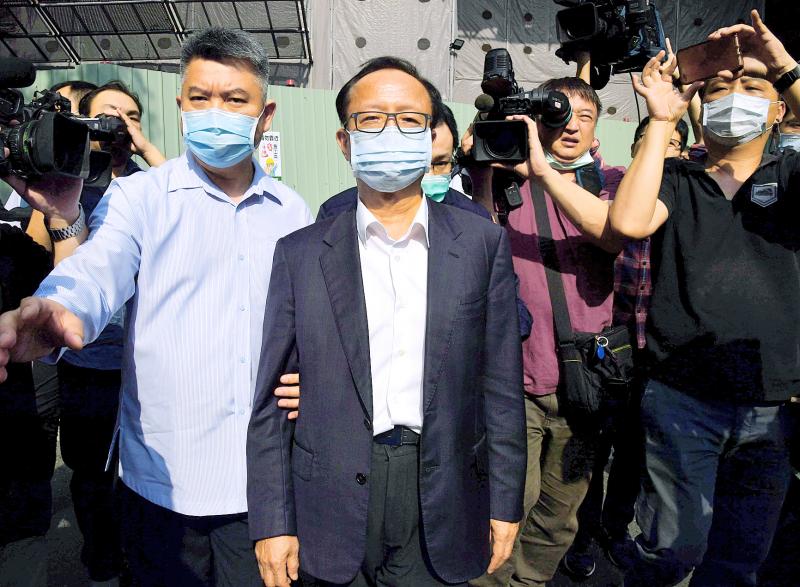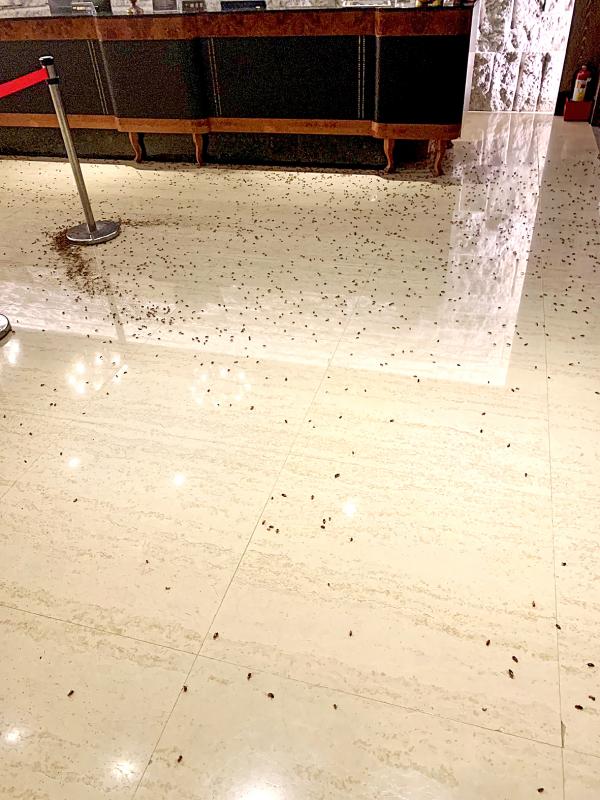A debt dispute between a restaurant owner and a criminal ring might be behind a bizarre cockroach attack at the Taipei eatery on Monday night while it was hosting a police gathering, Taipei Police Commissioner Chen Jia-chang (陳嘉昌) said yesterday.
Preliminary findings of a police investigation into the case at the G House Taipei suggest that the unusual incident might have been directed at the restaurant’s owner, who allegedly owes money to the Bamboo Union, Chen said.
The suspects were Bamboo Union members and there was no evidence indicating that the cockroaches were targeted at the police officers at the restaurant, he said.

Photo: CNA
He pledged to quickly arrest those involved and present details of the case.
Chen condemned the behavior and called it an act of violence, similar to attacking people with excrement or paint.
Those convicted would be dealt with in accordance with law, he said.

Photo courtesy of Taipei City Councilor Wang Hsin-yi
Zhongshan Deputy Chief Yu Yung-lien (余永廉) said that at 7:24pm on Monday, two men in black entered the restaurant and tossed what was estimated to be more than 1,000 small roaches — a type fed to fish — into the air near a counter on the second floor.
Additional police officers arrived three minutes after receiving a report, by which time the two men had fled on a scooter, Yu said.
Footage from surveillance cameras allowed police to identify five suspects, four men and a woman, he said.
Two of them dumped the roaches in the restaurant, two were lookouts and one was a driver, he said.
They left in different directions and vehicles to evade possible pursuers, but they would be caught, Yu said.
A police task force said that the incident was unlikely to be related to Chen’s presence or the police gathering, which was attended by more than 700 people, because Chen arrived after the roaches had been released.
The incident might be over unsettled debts with the gang, it said, adding that police would track down the person who ordered the attack and any others involved.

Starlux Airlines, Taiwan’s newest international carrier, has announced it would apply to join the Oneworld global airline alliance before the end of next year. In an investor conference on Monday, Starlux Airlines chief executive officer Glenn Chai (翟健華) said joining the alliance would help it access Taiwan. Chai said that if accepted, Starlux would work with other airlines in the alliance on flight schedules, passenger transits and frequent flyer programs. The Oneworld alliance has 13 members, including American Airlines, British Airways, Cathay Pacific and Qantas, and serves more than 900 destinations in 170 territories. Joining Oneworld would also help boost

A new tropical storm formed late yesterday near Guam and is to approach closest to Taiwan on Thursday, the Central Weather Administration (CWA) said. Tropical Storm Pulasan became the 14th named storm of the year at 9:25pm yesterday, the agency said. As of 8am today, it was near Guam traveling northwest at 21kph, it said. The storm’s structure is relatively loose and conditions for strengthening are limited, WeatherRisk analyst Wu Sheng-yu (吳聖宇) said on Facebook. Its path is likely to be similar to Typhoon Bebinca, which passed north of Taiwan over Japan’s Ryukyu Islands and made landfall in Shanghai this morning, he said. However, it

Taiwan's Gold Apollo Co (金阿波羅通信) said today that the pagers used in detonations in Lebanon the day before were not made by it, but by a company called BAC which has a license to use its brand. At least nine people were killed and nearly 3,000 wounded when pagers used by Hezbollah members detonated simultaneously across Lebanon yesterday. Images of destroyed pagers analyzed by Reuters showed a format and stickers on the back that were consistent with pagers made by Gold Apollo. A senior Lebanese security source told Reuters that Hezbollah had ordered 5,000 pagers from Taiwan-based Gold Apollo. "The product was not

COLD FACTS: ‘Snow skin’ mooncakes, made with a glutinous rice skin and kept at a low temperature, have relatively few calories compared with other mooncakes Traditional mooncakes are a typical treat for many Taiwanese in the lead-up to the Mid-Autumn Festival, but a Taipei-based dietitian has urged people not to eat more than one per day and not to have them every day due to their high fat and calorie content. As mooncakes contain a lot of oil and sugar, they can have negative health effects on older people and those with diabetes, said Lai Yu-han (賴俞含), a dietitian at Taipei Hospital of the Ministry of Health and Welfare. “The maximum you can have is one mooncake a day, and do not eat them every day,” Lai